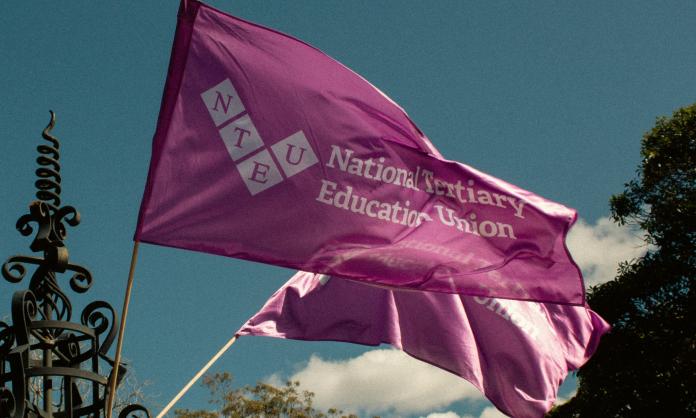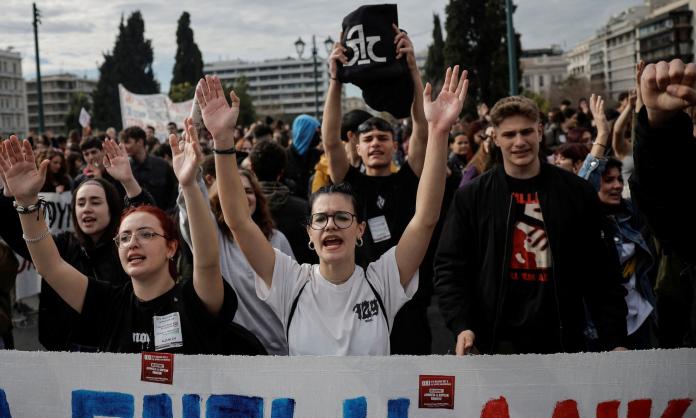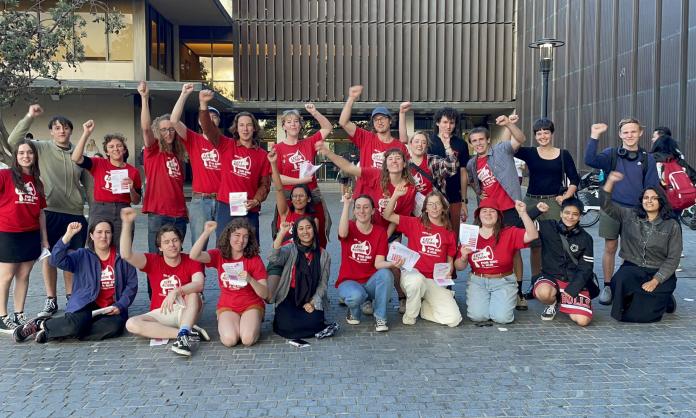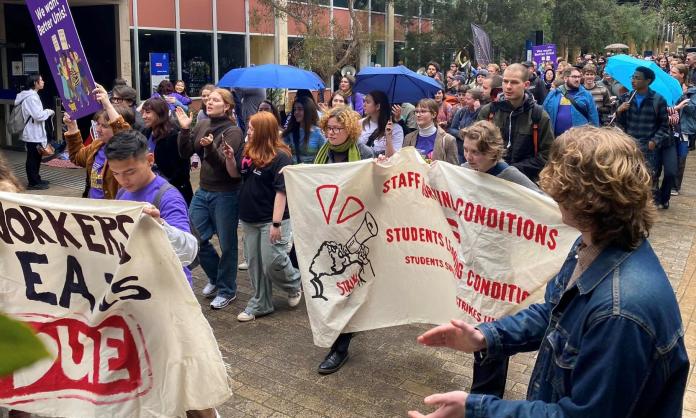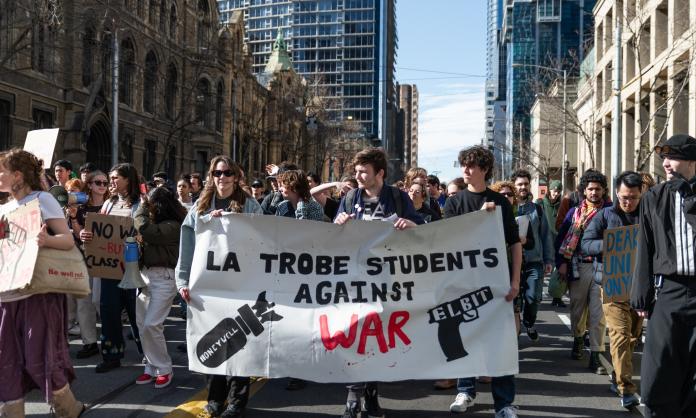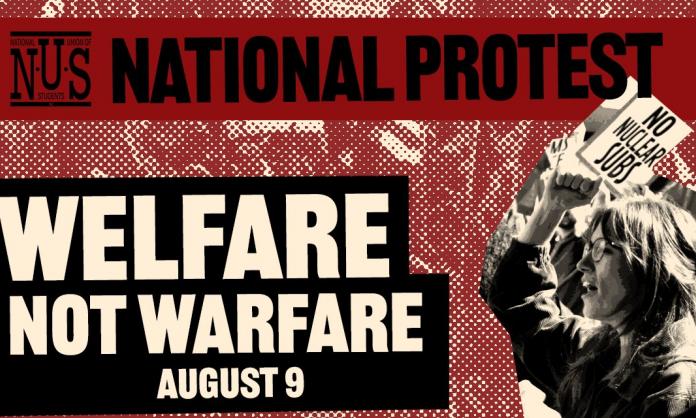Sydney University is in the midst of an important industrial campaign as we fight for our next enterprise agreement. The campaign is happening in the context of plummeting living standards, job losses and a huge betrayal from our National Tertiary Education Union leaders in 2020, when they tried to ram through the now-infamous Jobs Protection Framework (JPF), which proposed a pay cut of up to 15 percent for university staff across the country. Despite the challenges to organising posed by this situation, we have had four successful strikes this year at Sydney Uni.
There has been heated debate within the union all along, however, including about the need for ongoing strikes. Just as we saw with the fight against the JPF, many of those arguing for concessions to the university, or who oppose the kind of militant strike campaign we need to win in the current context, are self-described socialists, such as those from the small socialist group Solidarity and some other academic Marxists, and including branch president Nick Riemer.
Unfortunately, a consistent bloc has been formed between this group, calling itself Rank and File Action (RAFA) in the recent NTEU election, and the more right-wing elements who ran under the name Thrive. In every important debate so far, this bloc has been united in opposing the more militant approach of NTEU Fightback, a rank-and-file caucus in the union, which nationally led the fight to defeat the JPF sell-out in 2020.
This article is a look at the debates that have played out this year, as we approach an important stage in our campaign. It’s important to know where various groups stand in debates about industrial action at Sydney University, and reflect on the best strategy to take us forward.
Strikes
The overarching debate has been about strikes. NTEU Fightback has consistently argued that we need strike action to win. Strikes are the most disruptive and effective form of industrial action because they can involve every section of the university workforce, from administration workers to casual academics, gardeners, IT workers and librarians. They also involve the people whose education we are trying to defend: students, who have stood shoulder to shoulder with us on picket lines, making sure management know that we are united.
The right of the union has opposed or tried to limit strikes from the beginning. In place of strikes, they’ve argued for ineffectual administration bans that put much less pressure on management and are a much more individualised and disempowering form of industrial action. They involve only a minority of union members (who are a minority of overall university staff) and open those people up to victimisation, as has been the case in previous campaigns at UNSW and most recently at Swinburne.
RAFA is now working with the right to embark on this failed tactic, and is pursuing a new protected action ballot to facilitate it. Both the right and RAFA members are dishonestly calling this step backwards an “escalation”, including NTEU branch President Nick Riemer and Solidarity’s Sophie Cotton, who is on the branch committee.
They say that administration bans are not counterposed to strike action. In reality, however, the people who have argued for these bans are the same people who have stood in the way of maximising strike action from the beginning—that is, the whole RAFA/Thrive bloc. NTEU Fightback’s argument that administration bans are at best a distraction from the need to call more proper strikes is sadly being borne out.
In the strikes that occurred at the end of semester one, Solidarity again led a bizarre right-wing intervention. To discredit the strikes, Sydney University management began a hysterical campaign of misinformation, labelling picketers violent and aggressive. They even used examples of violent scabs attacking picketers, such as one incident in which a picketer was knocked to the ground and injured, as examples of “violent picketers”. But rather than repudiate these appalling lies by university bosses, Solidarity agreed with the slander, concocted their own lies about “violent” and “aggressive” picketing, and carried this slander into the union itself, all to try to win favour among right-wing elements in the union and to isolate NTEU Fightback, the people most associated (proudly!) with staunch picketing.
Now, six weeks into second semester (and despite claims from RAFA and the bargaining team about “significant wins”), university managers are yet to budge on any of our main claims. As the latest update to union members says, on “improvements to professional and academic job-security, de-casualisation and casual rights (including pay for all hours worked), and 40:40:20—management have shown themselves to be exceptionally hostile. We’re also yet to discuss pay”.
Given this situation, after three days of strikes at the end of semester one, we should have escalated the campaign and hit the ground running with more strikes from the start of semester two. Instead, the initial proposal from RAFA was to not have any action until Open Day on 27 August, five weeks into term, and vague plans to “escalate” after that. Thanks to the arguments from NTEU Fightback, we ended up with one 24-hour strike in week three. But the strike was not as effective or as long as it could have been.
During the break between semesters, at a members’ meeting on 7 July, I moved a motion to call a strike of at least 48 hours for week three of semester two. I argued that we needed to call the strike with plenty of notice so that we could do the building work required to recruit people to our pickets.
The week before, my motion to strike had been lost in the branch committee meeting. After their motion to oppose a strike was also lost, members of Solidarity and RAFA held a caucus with Thrive. Mike Beggs (an editor at Jacobin magazine and a figure usually associated with the right/Thrive faction) wrote to the branch committee in an email on 29 June, “Since Alma indicated her intention to put the failed motion to the members meeting, the non-Fightback members of BC discussed among ourselves and all decided to support an alternative motion”. They then co-signed a motion, which they moved at the members meeting, arguing against calling the strike and to instead wait almost a month, until 2 August, to maybe call a strike.
They had allowed themselves to be cowed by an empty threat from management that no bargaining would take place if a strike were called, and instead placed their hopes for the class struggle in a month of “intensive bargaining”, with an increased frequency of meetings with management’s out-sourced corporate lawyer. The results of this brilliant tactic are summed up in the failure to make progress, reported above.
At the 2 August meeting, I again moved a motion for a 48-hour strike. RAFA again formed a bloc with Thrive to vote it down. Solidarity member Matte Rocheford argued against the 48-hour strike on the basis that he was “dog tired” after taking strike action in semester one (that is, three months earlier).
The other argument deployed was that old favourite of every union bureaucrat—that the union members wouldn’t support more strikes. It’s true of course that more needs to be done to involve more members in the campaign, improve turn-out to pickets etc, which is why I argued to call the strike earlier—to give ourselves more time to mobilise for it.
There is every reason to have confidence that we can do this. Our union meetings have generally been big, between 150 and 350 people. The initial ballot in support of strikes won an overwhelming majority. The strikes have been well-observed, with the campus effectively shut down. And hundreds of new members have joined the NTEU since the strikes began.
The RAFA people making the argument that more strikes will lack support simultaneously acknowledged that the most recent strike was the best yet in terms of picket sign-ups. And it is simply not the case that we will build the union and involve more members by calling fewer strikes! On the contrary, university staff know that only a serious and militant campaign can win, and wider layers of staff can be mobilised on that basis. A turn to administration bans, when we still have several weeks of semester left in which to have proper strikes, will have a demobilising effect.
In the end, the week three strike was voted up as a 24-hour strike. One justification raised to oppose a 48-hour strike was that Open Day on 27 August was going to be the alternative strike day. But days prior to the event, the language switched from calling it an Open Day strike to Open Day “action”—with no industrial action. It seems there was never any intention of calling a strike on Open Day. But it did mean that weeks were wasted without increasing the pressure on management.
At the most recent branch committee meeting on 31 August, this approach of minimising and delaying strike action continued. Fightback moved a motion for further strike action in week eight and in week ten. Nick Riemer, Sophie Cotton, Finola Laughren (members of RAFA) again joined members of Thrive to vote against the week eight strike. I will now put this motion to the next members’ meeting.
It’s clear from all this that if RAFA and Solidarity had had their way, for all of semester two there would have been only some Open Day leafleting and then one strike, late in semester—a significant de-escalation of the whole campaign, while management spits in our faces and we run out of time to call strikes during semester.
The debate over pay
NTEU Fightback had been campaigning to lift our national wage claim long before inflation hit current levels, publishing an open letter in March. Eventually, the union’s national executive was shamed into lifting the claim, but only to 15 percent over three years. Meanwhile, the cost of living has continued to rise. NTEU Fightback has kept our campaign going.
On 10 June, I moved a motion in the branch committee for our wage claim to be lifted to CPI plus 2.5 percent. The motion won. Not long after, union meetings of hundreds of members around the country, including at RMIT, ANU and Melbourne Uni, were inspired to pass similar motions endorsing this higher wage claim.
The national executive met again and lifted the wage claim to CPI plus 1.5 percent or 15 percent, whichever is higher. This is a step in the right direction and would not have happened without our campaign. But it still sought to impose an upper limit pay claim below what many union members had just voted for.
In the debate over CPI plus 2.5 percent vs CPI plus 1.5 percent, Solidarity and RAFA have once again sided with the right of the union, including the national officials. At a subsequent meeting on 13 July, Nick Riemer moved a motion (supported by Sophie Cotton of Solidarity) to keep our wage claim at CPI plus 1.5 percent as the national officials had decreed, effectively overturning my original motion.
The debate is important, not only regarding the pay claim itself, but as an indication of whether or not you are willing to stand up to the national NTEU bureaucracy, the same people who just two years ago were proposing up to 15 percent wage cuts and who have a history of winding up and selling-out union struggles at Sydney Uni. On this front, RAFA and Solidarity have shown again that they cannot be relied on, just as they couldn’t be relied on during the fight against the JPF.
The NTEU recently signed a terrible deal at Western Sydney University, which will impose a cut in real wages of more than 7 percent for most workers in its first year alone, and attacks on a range of other conditions. What’s even worse is that this deal has been celebrated by NTEU officials as a “fantastic, historic achievement” and a “ground-breaking win”.
This shows just how much their commitment to CPI plus 1.5 percent is worth in practice, and indicates the kind of deal they would be willing to sign elsewhere. At Sydney Uni, Nick Riemer from RAFA has seemingly echoed this rhetoric, telling student newspaper Honi Soit that the Western Sydney deal “should reset [enterprise agreement] negotiations everywhere”. Such a deal would represent a huge pay cut and a further whittling down of conditions.
Unfortunately, we have already seen such dishonest tactics deployed in our current Sydney Uni campaign by members of RAFA and Solidarity when they colluded with the right in advocating a trade-off on casual conversion. In April, before a single day of strike action had taken place, they argued in support of trading off the only substantive conversion clause in our claim in return for 150 ongoing jobs and an undefined number of PhD fellowships. Recent figures released by the bargaining team indicate that this was a decision to sell-out around 70 percent of casuals at the university in favour of 30 percent of casuals who are current PhD students, of whom only a tiny minority might get these fellowships. This was also sold to members as a “win”.
There has also been a concerted effort to keep “no concessions” unionists off the bargaining team. Leading members of RAFA including Nick Riemer and Sophie Cotton have colluded with the right to lock out our candidate. On a similar note, requests from NTEU Fightback members for more detailed bargaining updates in line with our log of claims, as well as the release of all clauses drafted so far, have been ignored.
Branch elections
It is in this context that Solidarity (with author unnamed) recently published a ludicrous and slanderous article attacking NTEU Fightback for refusing to preference them and RAFA in recent NTEU branch elections. It is a desperate attempt to cover up their appalling record in the campaign so far. These people, who have been in a solid bloc with Thrive on every substantial question in the campaign, and who at this very moment are working together to wind down the strike campaign, are complaining that Fightback preferenced a couple of Thrive people to fill the irrelevant bottom positions on our how-to-vote material.
The reality is that the individuals we put there have played much less of a role in opposing strikes than have members of Solidarity. It has consistently been Solidarity and people from RAFA who have led the arguments to not call strikes, to favour administration bans, to not have longer strikes, to water down our picket lines and to drop our casual conversion claim. RAFA as a ticket also did not back the challengers to the incumbents in national office, despite the incumbents being the architects of the JPF.
In opposing more strikes, and the kind of campaign that could actually win more concessions from the university, the RAFA/Thrive/Solidarity bloc are setting up the branch for some kind of Western Sydney Uni pay-cut deal. Such a deal, it seems, would be sold as a “win”. We in Fightback are committed to doing all we can to escalating our campaign and stopping such a sell-out.
Alma Torlakovic is a long-time activist and delegate at the University of Sydney and a member of the NTEU branch committee.




